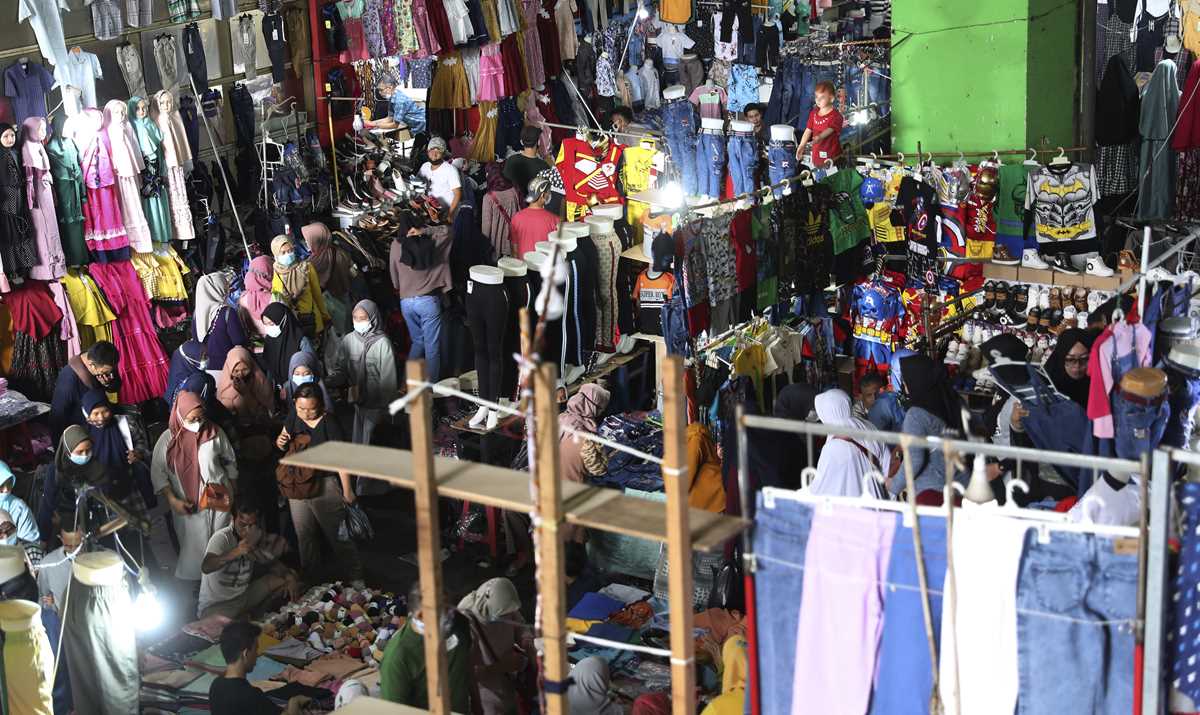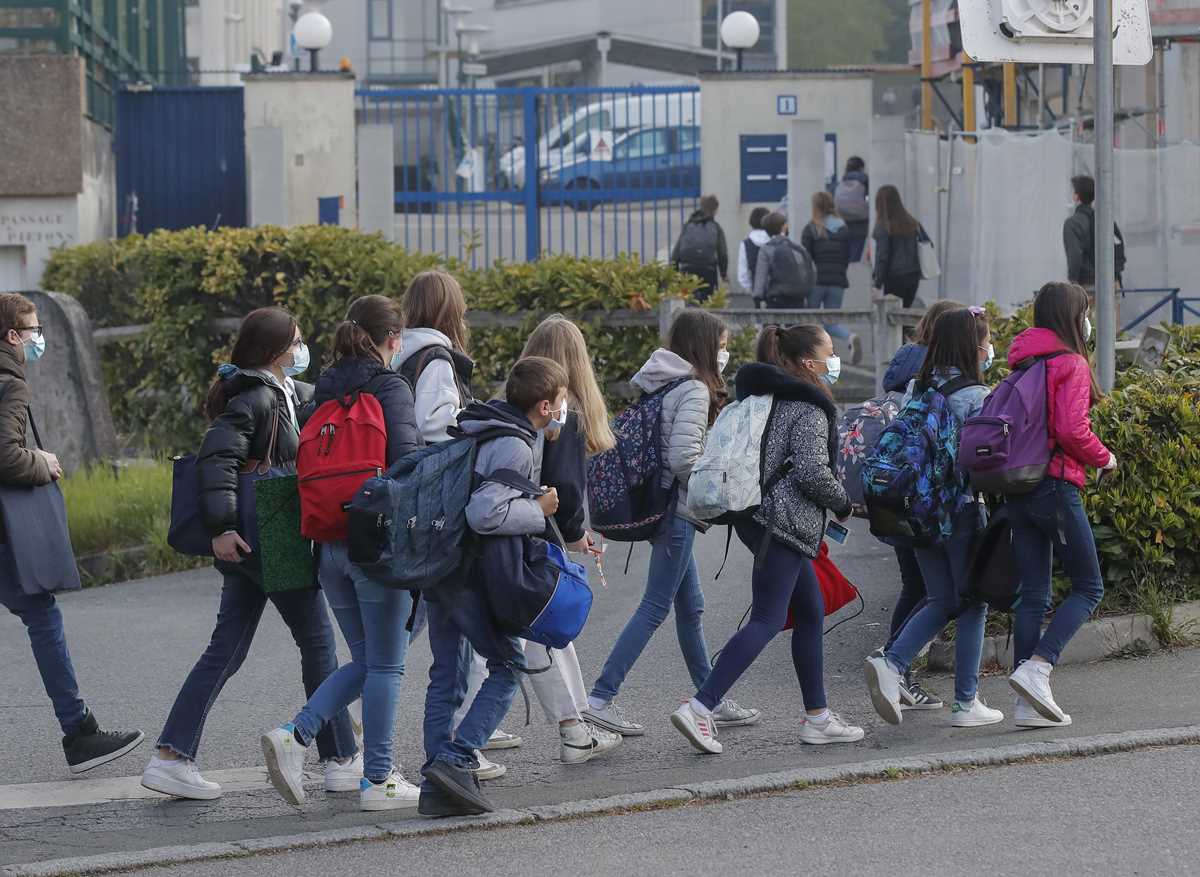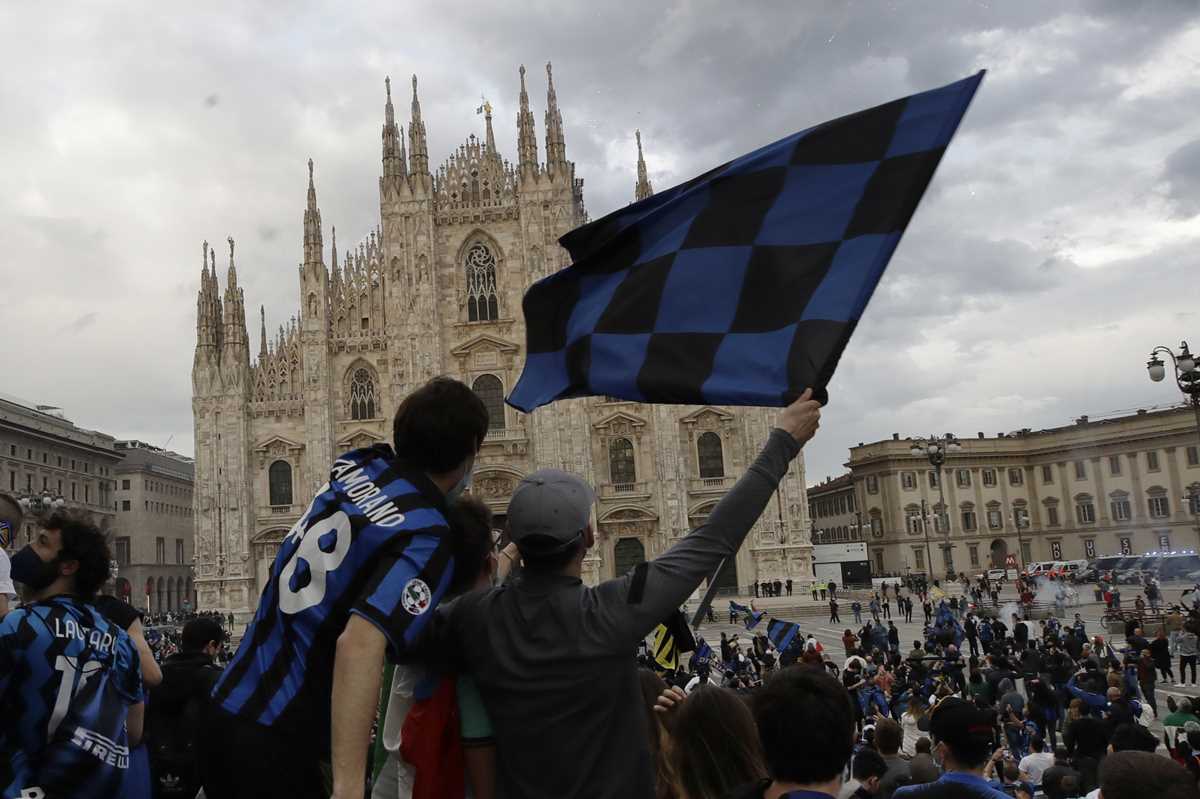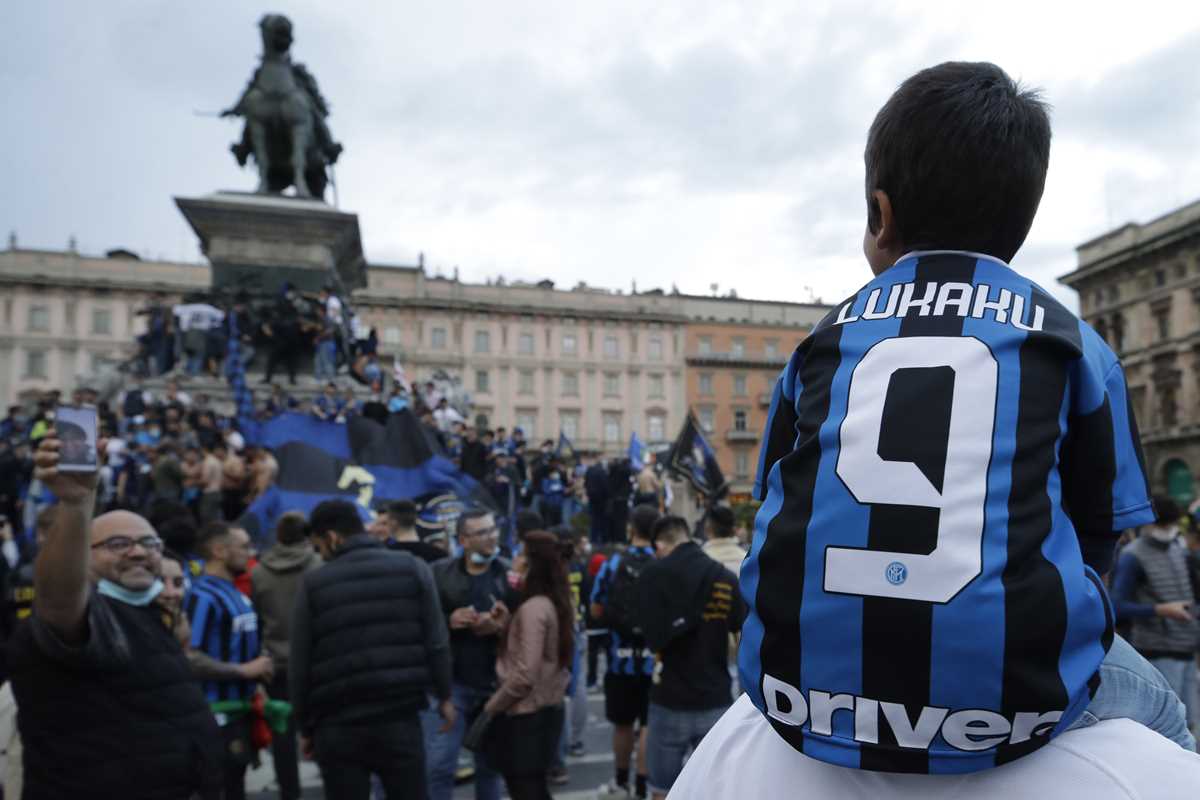 Students arrive at school in Versailles, west of Paris, Modnay, May 3, 2021. Students go back to secondary and high schools and a domestic travel ban will end. The French government is slowly starting to lift partial lockdowns, despite still high numbers of coronavirus cases and hospitalized COVID-19 patients. (AP Photo/Michel Euler)
Students arrive at school in Versailles, west of Paris, Modnay, May 3, 2021. Students go back to secondary and high schools and a domestic travel ban will end. The French government is slowly starting to lift partial lockdowns, despite still high numbers of coronavirus cases and hospitalized COVID-19 patients. (AP Photo/Michel Euler) A municipal worker fumigates as supporters of Bharatiya Janata Party wait outside a vote counting center in Gauhati, India, Sunday, May 2, 2021. Preliminary voting trends released by India's electoral body on Sunday indicate Prime Minister Narendra Modi’s Hindu nationalist party failed to make gains in four recent state elections, a sign his political strength may be slipping as the country struggles to contain an unprecedented surge in coronavirus cases. (AP Photo/Anupam Nath)
A municipal worker fumigates as supporters of Bharatiya Janata Party wait outside a vote counting center in Gauhati, India, Sunday, May 2, 2021. Preliminary voting trends released by India's electoral body on Sunday indicate Prime Minister Narendra Modi’s Hindu nationalist party failed to make gains in four recent state elections, a sign his political strength may be slipping as the country struggles to contain an unprecedented surge in coronavirus cases. (AP Photo/Anupam Nath) People wear face masks to help curb the spread of the coronavirus at a market in Jakarta Monday, May 3, 2021. (AP Photo/Achmad Ibrahim)
People wear face masks to help curb the spread of the coronavirus at a market in Jakarta Monday, May 3, 2021. (AP Photo/Achmad Ibrahim) Students arrive at school in Le Chesnay, west of Paris, Modnay, May 3, 2021. Students go back to secondary and high schools and a domestic travel ban will end. The French government is slowly starting to lift partial lockdowns, despite still high numbers of coronavirus cases and hospitalized COVID-19 patients. (AP Photo/Michel Euler)
Students arrive at school in Le Chesnay, west of Paris, Modnay, May 3, 2021. Students go back to secondary and high schools and a domestic travel ban will end. The French government is slowly starting to lift partial lockdowns, despite still high numbers of coronavirus cases and hospitalized COVID-19 patients. (AP Photo/Michel Euler) Inter Milan fans celebrate and shout slogans in Piazza Duomo square in front of the gothic cathedral after Inter Milan won its first Serie A title in more than a decade after second-placed Atalanta drew 1-1 at Sassuolo, in Milan, Italy, Sunday, May 2, 2021. Atalanta needed to win to avoid Inter mathematically clinching the title with four matches remaining. It was Inter's first trophy since 2011 and the first Serie A title since 2010. (AP Photo/Luca Bruno)
Inter Milan fans celebrate and shout slogans in Piazza Duomo square in front of the gothic cathedral after Inter Milan won its first Serie A title in more than a decade after second-placed Atalanta drew 1-1 at Sassuolo, in Milan, Italy, Sunday, May 2, 2021. Atalanta needed to win to avoid Inter mathematically clinching the title with four matches remaining. It was Inter's first trophy since 2011 and the first Serie A title since 2010. (AP Photo/Luca Bruno) Hinchas del Inter de Milán celebran la conquista del scudetto en la Piazza Duomo, el domingo 2 de mayo de 2021. (AP Foto/Luca Bruno)
Hinchas del Inter de Milán celebran la conquista del scudetto en la Piazza Duomo, el domingo 2 de mayo de 2021. (AP Foto/Luca Bruno) Inter Milan fans celebrate and shout slogans in Piazza Duomo square in front of the gothic cathedral after Inter Milan won its first Serie A title in more than a decade after second-placed Atalanta drew 1-1 at Sassuolo, in Milan, Italy, Sunday, May 2, 2021. Atalanta needed to win to avoid Inter mathematically clinching the title with four matches remaining. It was Inter's first trophy since 2011 and the first Serie A title since 2010. (AP Photo/Luca Bruno)
Inter Milan fans celebrate and shout slogans in Piazza Duomo square in front of the gothic cathedral after Inter Milan won its first Serie A title in more than a decade after second-placed Atalanta drew 1-1 at Sassuolo, in Milan, Italy, Sunday, May 2, 2021. Atalanta needed to win to avoid Inter mathematically clinching the title with four matches remaining. It was Inter's first trophy since 2011 and the first Serie A title since 2010. (AP Photo/Luca Bruno) Inter Milan fans celebrate and shout slogans in Piazza Duomo square in front of the gothic cathedral after Inter Milan won its first Serie A title in more than a decade after second-placed Atalanta drew 1-1 at Sassuolo, in Milan, Italy, Sunday, May 2, 2021. Atalanta needed to win to avoid Inter mathematically clinching the title with four matches remaining. It was Inter's first trophy since 2011 and the first Serie A title since 2010. (AP Photo/Luca Bruno)
Inter Milan fans celebrate and shout slogans in Piazza Duomo square in front of the gothic cathedral after Inter Milan won its first Serie A title in more than a decade after second-placed Atalanta drew 1-1 at Sassuolo, in Milan, Italy, Sunday, May 2, 2021. Atalanta needed to win to avoid Inter mathematically clinching the title with four matches remaining. It was Inter's first trophy since 2011 and the first Serie A title since 2010. (AP Photo/Luca Bruno)GENEVA — The World Health Organization is set to decide this week whether to approve two Chinese vaccines for emergency use against COVID-19, a top WHO official says.
Such an approval would mark the first time that a Chinese vaccine had ever been granted a so-called emergency use listing from the U.N. health agency, and would trigger a broader rollout of Chinese vaccines that are already being used in some countries other than China.
Mariangela Simao, assistant director-general for access to medicines, vaccines and pharmaceuticals, says some “final arrangements” remain to be made before the crucial word from a WHO technical advisory group comes on the Sinopharm and Sinovac vaccines.
“We expect that we’ll have both decisions by the end of this week,” she said.
WHO has said it expects a decision on the Sinopharm vaccine to come first, and Sinovac afterward.
“We know that some countries depend on this decision to proceed with their vaccination,” Simao said.
___
THE VIRUS OUTBREAK:
— Russia lags behind others in its COVID-19 vaccination drive
— Russia is turning to multiple Chinese firms to manufacture Sputnik vaccine as demand soars
— Residents in Madrid vote Tuesday for a new regional assembly in an election that tests people’s resistance to lockdown measures
— Nurses wearied by pandemic duty incensed by request to help at Tokyo Olympics
— Follow more of AP’s pandemic coverage at https://apnews.com/hub/coronavirus-pandemic and https://apnews.com/hub/coronavirus-vaccine
___
HERE’S WHAT ELSE IS HAPPENING:
NEW YORK — Gov. Andrew Cuomo said New York City’s subway will begin rolling all night again and capacity restrictions for most types of businesses will end statewide in mid-May as COVID-19 infection rates continues to decline.
Cuomo announced last week that the subways would close from 1 a.m. to 5 a.m. so trains and stations could be disinfected. The change was also intended to make it easier to remove homeless people from trains where many had been spending the night.
The overnight closure was scaled back to 2 to 4 a.m. in February.
___
BOSTON — Massachusetts plans on closing four of its seven mass vaccination sites by the end of June in favor of a more targeted approach to reach the roughly 30% of the state’s eligible population that has not yet received at least one dose of a coronavirus vaccine, Gov. Charlie Baker said Monday.
The state will instead send more doses to 22 smaller regional sites, expand mobile vaccination efforts, and bring vaccine clinics to senior centers, YMCAs, houses of worship and other community sites, the Republican governor said.
While there has been some hesitancy among people who have not yet been vaccinated, more often that not, it’s a matter of convenience, Baker said, and he wants to make it as easy as possible to get a shot. The state can change it focus because it is on target to reach its goal of getting more than 4 million people vaccinated by the end of May.
___
GENEVA — Top scientists at the World Health Organization are highlighting signs that vaccination against COVID-19 is reducing transmission, and that vaccination of about half of a country’s population is followed by “significant reductions” in cases.
Dr. Soumya Swaminathan, WHO’s chief scientist, said such evidence about coverage rates has turned up even as a colleague bemoaned how countries that have not had access to vaccines are trailing behind -- and are facing growing rates of hospitalization.
WHO has repeatedly expressed concerns about a lack of equity in access to vaccines -- with many rich countries able to obtain them, and many poorer countries getting few doses or none.
Maria Van Kerkhove, technical lead on COVID-19 at WHO, also pointed to some “hopeful signs that vaccination is also reducing transmission” -- even if studies into the matter are not completed.
___
JOHANNESBURG — South Africa received its first batch of the Pfizer vaccine when 325,260 doses arrived at the O.R. Tambo International Airport in Johannesburg, officials confirmed Monday.
A sample of the doses will be tested for quality control before they are distributed around the country. Several more deliveries of the Pfizer vaccine are expected to arrive in the coming weeks as South Africa expects nearly 4.5 million doses of the vaccine by the end of June and it expects 30 million doses by the end of the year.
South Africa is also expecting delivery of 31 million doses of the Johnson & Johnson vaccine for its mass vaccination campaign which aims to inoculate 40 million of South Africa’s population of 60 million people by February 2022.
So far South Africa has inoculated just over 317,000 of its 1.2 million health care workers. South Africa has by far the most cases and deaths of COVID-19 in all of Africa. South Africa has a cumulative total of more than 1.58 million confirmed cases, including more than 54,000 deaths, representing more than Africa’s 4.5 million reported cases, according to the Africa Centers for Disease Control and Prevention South Africa.
___
MILAN — Medical experts and politicians expressed concern Monday about a possible spike in virus contagion after thousands of jubilant soccer fans converged on Milan’s main Piazza Duomo after Inter Milan claimed the Serie A title for the first time since 2010.
A crowd estimated at up to 30,000 people gathered in the heart of Milan Sunday, chanting and singing, setting off flares and fireworks, just a week after six months of virus restrictions began lifting in much of Italy. Many wore masks, but they were pulled down below their noses.
The head of Italy’s national health council, Franco Locatelli, told SKY TG24 that such scenes need to be avoided during a pandemic that has claimed 121,000 dead in Italy.
Virologists expressed concern of a possible spike in two weeks, adding hopes that the vaccine campaign that has covered most over-70s will protect those most vulnerable to serious consequences of the virus.
Regional officials said it was impossible to control a crowd of that size while the province’s top law enforcement official said they considered closing the large piazza but did not due to safety concerns of moving the crowd into smaller spaces with fewer exit points.
___
COPENHAGEN, Denmark — The single-dose Johnson & Johnson COVID-19 vaccine has been taken out of Denmark’s vaccination program to investigate reports of rare but potentially dangerous blood clots, Danish health authorities said Monday.
Denmark has already taken the AstraZeneca COVID-19 vaccine out of its vaccination program. Both the J&J and AstraZeneca shots are made with similar technology.
In a statement, the Danish Health Authority said it “has concluded that the benefits of using the COVID-19 vaccine from Johnson & Johnson do not outweigh the risk of causing the possible adverse effect.”
___
MANILA, Philippines — Philippine President Rodrigo Duterte was injected with a COVID-19 vaccine from China on Monday, officials said. The Sinopharm vaccine used on the 76-year-old leader has not been authorized for wide emergency use in the country.
Presidential spokesman Harry Roque said Duterte got his first dose of the Sinopharm vaccine using a “compassionate use” permit issued by Manila’s Food and Drug Administration.
Duterte said it took his doctor a long time to assess before deciding to immunize him with the jab from the Chinese state-owned vaccine maker. The president was accompanied by his former aide, now Sen. Christopher “Bong” Go, who said that Duterte wanted to be inoculated to encourage more Filipinos to receive the vaccine.
Duterte and his administration have come under criticisms for a vaccination campaign that has faced delays, supply problems and public skepticism. More than 1.5 million Filipinos have been injected so far with their first dose of Sinovac and and AstraZeneca vaccine, a tiny fraction of the 70 million Filipinos the government aims to vaccinate to curb coronavirus outbreaks.
___
HONOLULU — Health officials in Hawaii have reported 113 newly confirmed COVID-19 cases across the state Sunday, increasing the statewide total to more than 32,500 infections since the pandemic began early last year.
The Hawaii Department of Health said there were no virus-related deaths, keeping the statewide total at 483 deaths, including 374 fatalities on Oahu.
Officials say the report includes cases reported to the department on Friday. Data from the Centers for Disease Control and Prevention shows more than 53% of the state’s population has received at least one COVID-19 vaccine dose and 35% of the population is fully vaccinated.
___
AMSTERDAM — The European Union’s drug regulator says it has begun evaluating a request by Pfizer Inc. and BioNTech to extend approval of their coronavirus vaccine to include children aged 12 to 15.
The European Medicines Agency said Monday that its human medicines committee will carry out an accelerated assessment of data submitted by Pfizer and BioNTech. It is expected to reach a decision in June, unless it requires extra information.
On Friday the two pharmaceuticals said their request is based on an advanced study in more than 2,000 adolescents that showed their vaccine to be safe and effective. The companies’ vaccine is currently approved for use in people aged 16 years and older. Extending that approval to the younger age group could offer younger and less at-risk populations in Europe access to the shot for the first time.
___
MADRID — Spain’s health minister said Monday that authorities expect to reach within 24 hours the milestone of 5 million people fully inoculated against COVID-19.
Health Minister Carolina Darias told reporters that Spain is on track for its goal of vaccinating before the summer 70% of the adult population, or around 33 million people.
Vaccination centers are working seven days a week, Darias said, and by the first week of June some 10 million people will be fully inoculated.
Darias urged continuing caution. She said Spain’s COVID-19 incidence rate per 100,000 people over 14 days — an important measure of the pandemic’s spread — is 229 but varies widely between regions, with some lower than 70 and others in the range of 400-500.
___
KATHMANDU, Nepal — Nepal is halting all domestic and international flights because of spiking cases of COVID-19 in the Himalayan nation.
Prime Minister Khadga Prasad Oli said domestic flights would be stopped from Monday while all international flights would cease to fly in and out of Nepal from Thursday.
He appealed to other countries for vaccines, diagnostic equipment, oxygen and other supplies to help combat the pandemic.
India donated 1 million doses of vaccine followed by China providing another 800,000. However, India’s ban on exporting vaccines has hindered Nepal’s vaccine campaign, which began in January.
Nepal is still waiting for the 1 million doses from an Indian company which it already paid for in March.
___
STOCKHOLM — Sweden plans to donate 1 million doses of AstraZeneca vaccines to India via the U.N.-backed COVAX, an initiative devised to give countries access to coronavirus vaccines regardless of their wealth.
The Scandinavian country’s International Development Cooperation Minister Per Olsson Fridh announced it Monday on Swedish broadcaster SVT, adding “we see how the pandemic is raging around the world. People are dying, poverty is spreading, and children are still not back at school.”
“We need to do everything we can to face this pandemic and fight it across the world.”
The donation will have no impact on the rollout in Sweden which has decided to only administer the AstraZeneca shots to people 65 and over.
The country’s vaccine coordinator Richard Bergstrom said there are enough spare vaccines that Swedes can give away, adding “This is just a million ... we actually have another 4 or 5 million more of Astra Zeneca’s vaccine that we can share later.”
Before you consider Johnson & Johnson, you'll want to hear this.
MarketBeat keeps track of Wall Street's top-rated and best performing research analysts and the stocks they recommend to their clients on a daily basis. MarketBeat has identified the five stocks that top analysts are quietly whispering to their clients to buy now before the broader market catches on... and Johnson & Johnson wasn't on the list.
While Johnson & Johnson currently has a "Hold" rating among analysts, top-rated analysts believe these five stocks are better buys.
View The Five Stocks Here
MarketBeat just released its list of 10 cheap stocks that have been overlooked by the market and may be seriously undervalued. Click the link below to see which companies made the list.
Get This Free Report